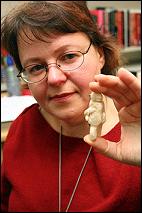Witchcraft paper casts a spell over students
Witchcraft paper casts a spell over students

Dr Gina Salapata holds a “voodoo” doll.
Wednesday, August 13,
2008
Witchcraft paper casts a spell over
students
Charms and curses have been flooding into the office of Dr Gina Salapata, but the senior classics lecturer is happy to have them, along with the odd “voodoo” doll.
Dr Salapata, along with Dr Karen Jillings and Dr Chris van der Krogt from the School of History, Philosophy and Classics, is running a new extramural paper this semester entitled Magic and Witchcraft, which looks at how the supernatural has been revered and reviled through history.
Students study the use of sorcery in the classical world, medieval and early modern times and in colonial Maori culture as part of the 100-level paper offered extramurally.
Dr Salapata says the idea for the paper grew out of her background in classics. “I had thought it would be good to have a paper on magic and witchcraft in my programme and when one of my colleagues suggested the topic we decided to make it a collaborative effort.”
The first assignments have arrived from the 120 students enrolled in the paper and Dr Salapata marking them is already proving interesting.
“One of the options for the first assignment called on them to create a magical curse tablet or erotic charm and so far I’ve received everything from “voodoo” dolls to elaborate curses.”
However, the fanciful assignments must be backed up with research. “These things are not just made up,” she says. “The format of a curse or spell must be based on real examples from the classical period and reflect the beliefs of the practitioners.”
Paper co-ordinator Dr Chris van der Krogt says it provides students with an opportunity to develop their academic research and writing skills while exploring a fascinating topic. The lecturers are not advocating witchcraft but using the theme to open windows to past societies, he says.
“We are putting it in a historical context. I also teach about Christianity, but I’m not advocating it.”
Dr Salapata says the paper is proving popular with students studying in other University programmes, and should provide them with an introduction to history, philosophy and classics, leading them to take other courses.
ENDS


 Michael King Writers Centre: Shilo Kino Awarded 2025 Shanghai Writing Residency
Michael King Writers Centre: Shilo Kino Awarded 2025 Shanghai Writing Residency Burnett Foundation Aotearoa: S.L.U.T.S Might Be The Answer To Ending Syphilis Outbreak
Burnett Foundation Aotearoa: S.L.U.T.S Might Be The Answer To Ending Syphilis Outbreak Aotearoa Covid Action: Pharmac Urged To Widen Access To Covid Vaccines
Aotearoa Covid Action: Pharmac Urged To Widen Access To Covid Vaccines Howard Davis: Dick Frizzell’s Hastings & Studio International Revisited In Wellington
Howard Davis: Dick Frizzell’s Hastings & Studio International Revisited In Wellington Heritage New Zealand: New Education Resource On Ōtūmoetai Pā Released
Heritage New Zealand: New Education Resource On Ōtūmoetai Pā Released Bowel Cancer NZ: Broken Promise, Lost Lives - Govt’s Bowel Cancer Screening Pledge 98% Undelivered
Bowel Cancer NZ: Broken Promise, Lost Lives - Govt’s Bowel Cancer Screening Pledge 98% Undelivered